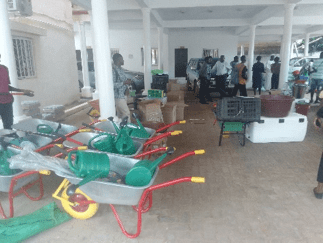By Tabora Bojang
The German Agency for International Cooperation (GIZ) in partnership with the Center for Policy, Research and Strategic Studies, CepRass, recently convened a day long training for financial service providers to enhance access to finance for start-ups in the agro sector.
GIZ assist Ecowas in creating the “Ecowas Fund for Regional Stabilisation and Development” in fragile regions within member states (TC-FRSD) aim to spur socio-economic stability and help prevent conflict and crises in the sub-region.
This informed the launch of a pilot project in the Gambia to offer skills development for youths, women and returning migrants in horticulture, poultry and fish farming.
The training aims to improve the digital capacity of financial service providers to boost the agro sector productivity and profits.
It also aims to develop policy guidelines for scaling up digital and agricultural value chain finance capability in The Gambia.
The project’s technical adviser access to finance, Mariama Ashcroft, described access to finance as one of the barriers that prevent young people from starting businesses in agriculture.
She said research has indicated that issues of regulations, risks considerations and lack of technical know are some of the factors that makes it difficult for banks and financial service providers to lend to agriculture.
“We want to engage different stakeholders in the eco-system to appreciate the challenges and be interested in opportunities to address those challenges. We are hopeful that after this initiative financial service providers will be motivated in establishing specialised units with trained staff dedicated to agriculture finance and lend successfully using different mechanisms like insurance and guarantee for agriculture loans,” Madam Ashcroft stated.
CepRass team leader Dauda Saho lamented the low inflow of funds from banks to the agriculture sector despite its huge contribution to the national economy.
“We need financial inflows into the sector and we can only do that if we better understand the agriculture value chain and inject new solutions and opportunities like digital financing,” he said.
Ya Sainey Tambadou, a participant from Insist Global which developed a business management tool with E-commerce and digital loan application, thanked GIZ-Ecowas for the project.
“We are expecting this forum to harness the agriculture sector and help entrepreneurs and startups, especially with funding which is a big challenge,” she said.
10 entrepreneurs get startup kits
Meanwhile the GIZ and it’s implementing partner Naccug also distributed starter kits to 10 new beneficiaries from the Greater Banjul Area engaged in poultry farming, horticulture and fisheries.
The handing over ceremony held at the Naccug head office in Kanifing was led by the union’s CEO Foday Sanyang.

The beneficiaries were selected after their business plans were reviewed and approved by a panel.
A total of 500 youth and women are targeted for this initiative with over 300 benefiting so far. To qualify for the grant, one must have a registered business, aged between 18-35, present a business within horticulture, fisheries and poultry.



